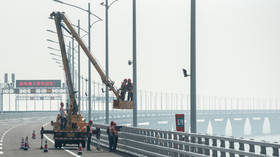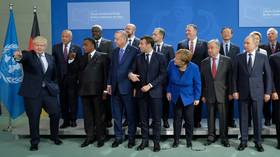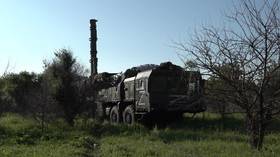China doubles down on infrastructure projects as trade war with US drags on

Beijing has doubled the value of government approved major infrastructure projects this year. The move aims to stabilize the Chinese economy amid the ongoing trade conflict with Washington.
The National Development and Reform Commission (NDRC) has approved 21 projects, worth at least 764.3 billion yuan ($107.8 billion), according to South China Morning Post (SCMP) calculations.
The amount is more than double the size of last year’s 374.3 billion yuan ($52.8 billion) in approvals recorded over the same period, which included 11 projects such as railways, roads and airports.
Also on rt.com China’s nation brand surges 40% to almost $20 TRILLIONThree of the infrastructure projects approved by the NDRC are worth more than 100 billion yuan ($14 billion). The most expensive on the list is the new high-speed railway network linking Chongqing and Kunming in southwest China. The project is worth a total of 141.6 billion yuan ($19.9 billion).
Sichuan province has been given the green light to spend 131.8 billion yuan ($18.4 billion) to build a new airport. Zhengzhou, the capital of Henan province, will be allowed to spend 113.9 billion yuan ($16 billion) to continue with the third phase of its urban rail transit network.
Infrastructure investment is expected to surge in the next several years. The National Bureau of Statistics data announced on Friday that actual infrastructure investment accelerated to 4.5% in the first nine months of 2019, up from 4.2% year on year in the first eight months.
In addition, the state planning commission has accelerated the approval of new coal mines, including in the regions of Inner Mongolia, Xinjiang, Shanxi, and Shaanxi. Total investment for the projects was valued at 91.12 billion yuan ($12.8 billion).
Also on rt.com Trump announces ‘biggest deal ever’ with China for US farmersBeijing has also allowed local governments to sell more special purpose bonds, whose proceeds can only be used to fund infrastructure projects. At the beginning of 2019, the Ministry of Finance raised the quota for special bonds to 2.15 trillion ($302 billion) from 1.35 trillion ($190 billion) last year. The central government has even brought forward a portion of the local governments’ 2020 quota so they could continue to raise funding for new projects.
“Infrastructure spending is the most direct and efficient way to stabilise economic growth,” Chow told the SCMP, adding that state firms often receive loans from state banks to spend on projects. “On the contrary, tax reduction is more passive [in terms of boosting growth], as businesses or individuals may not spend more just because they are paying less tax.”
For more stories on economy & finance visit RT's business section















